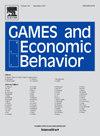Who gets the credit? Credit attribution, spillovers, and inefficiency in teams
IF 1
3区 经济学
Q3 ECONOMICS
引用次数: 0
Abstract
We examine team incentives in environments with positive spillovers and rewards based on ex-post public credit for collective success. Compared to the ex-ante efficient credit allocation that maximizes the team's overall payoff, ex-post credit distorts individual incentives: higher-ability or lower-cost agents receive excessive credit and overexert effort when spillovers are low, but are under-credited and insufficiently motivated when spillovers are high. To address these inefficiencies, organizations may optimally limit spillovers by restricting peer communication or reducing transparency in teamwork. Moreover, concerns about credit-sharing can deter agents from inviting collaborators or selecting the most capable partners when leading projects.
谁得到了荣誉?团队中的信用归因、溢出效应和低效率
我们研究了具有正溢出效应的环境中的团队激励,以及基于集体成功的事后公共信用的奖励。与事前有效的信用分配(使团队的总体收益最大化)相比,事后信用扭曲了个人激励:当溢出效应较低时,能力较高或成本较低的代理人获得了过多的信用,并付出了过度的努力,但当溢出效应较高时,他们的信用不足,动机不足。为了解决这些低效率问题,组织可以通过限制同伴沟通或降低团队合作的透明度来最佳地限制溢出效应。此外,对信用共享的担忧可能会阻止代理在领导项目时邀请合作者或选择最有能力的合作伙伴。
本文章由计算机程序翻译,如有差异,请以英文原文为准。
求助全文
约1分钟内获得全文
求助全文
来源期刊

Games and Economic Behavior
ECONOMICS-
CiteScore
1.90
自引率
9.10%
发文量
148
期刊介绍:
Games and Economic Behavior facilitates cross-fertilization between theories and applications of game theoretic reasoning. It consistently attracts the best quality and most creative papers in interdisciplinary studies within the social, biological, and mathematical sciences. Most readers recognize it as the leading journal in game theory. Research Areas Include: • Game theory • Economics • Political science • Biology • Computer science • Mathematics • Psychology
 求助内容:
求助内容: 应助结果提醒方式:
应助结果提醒方式:


